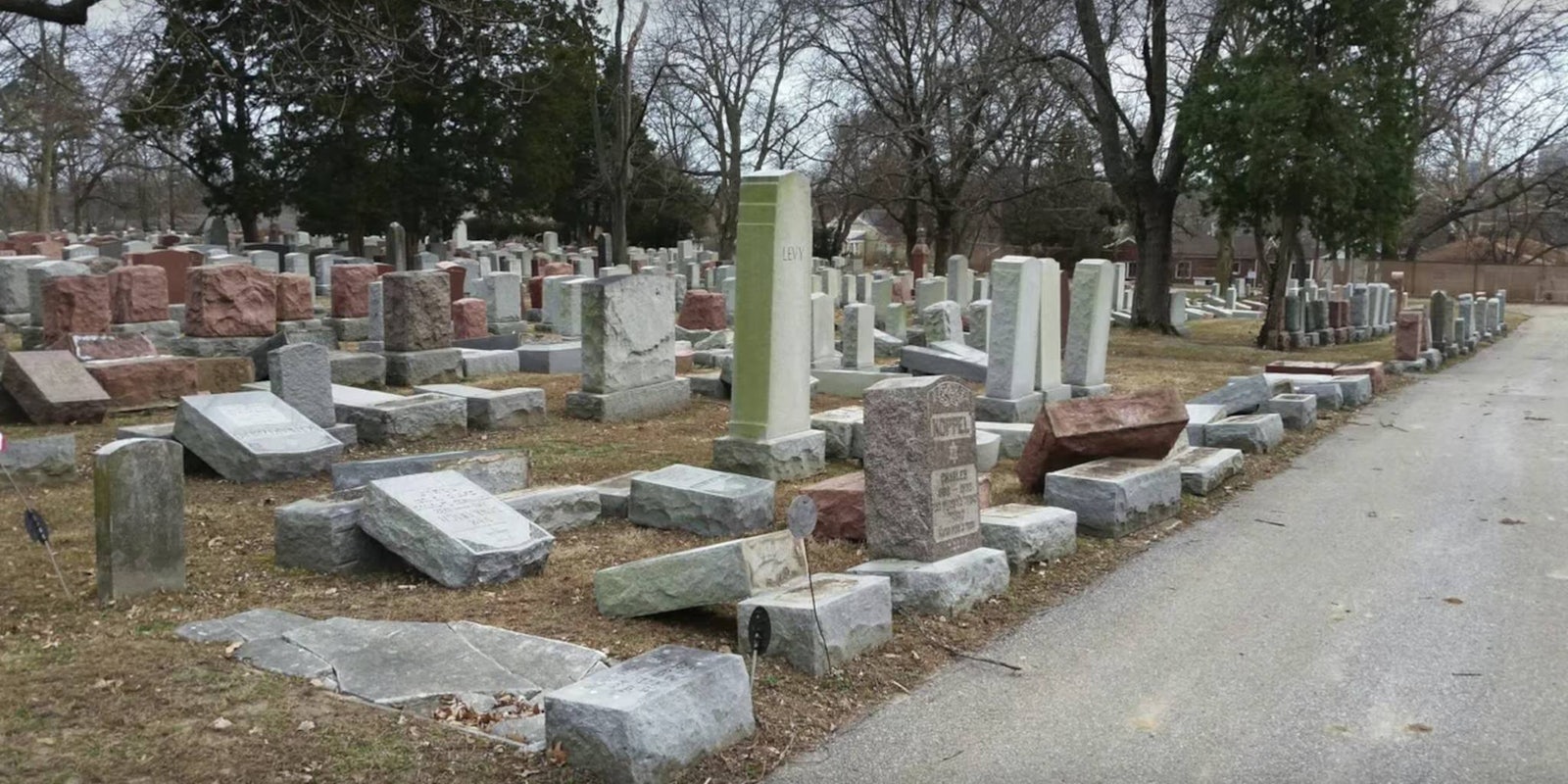Another wave of anti-Semitic attacks struck the country over the long weekend, as vandals destroyed dozens of headstones at a Jewish cemetery in St. Louis and 11 Jewish Community Centers received bomb threats yesterday.
No bombs were found during an investigation of the threats, and as of Monday, police had yet to declare the destruction at Chesed Shel Emeth Cemetary a hate crime, according to USA Today. But the vandalization speaks to a growing problem of anti-Semitism after the election of President Donald Trump.
Continue asking @POTUS to respond to increased #antisemitism, potentially now in St. Louis, headstones desecrated. Community concern high. pic.twitter.com/gstj2Yjc8O
— ADL Heartland (@ADLHeartland) February 21, 2017
Appears hundreds of graves vandalized at #STL Jewish cemetery. Damage is extensive. @andybankertv live report on @KPLR11 and @FOX2now at 5p pic.twitter.com/wneuIpl5MY
— Joe Lamie (@GIJoter) February 20, 2017
Yesterday’s bomb threats targeting community centers were the fourth wave this year, following three that took place in January, bringing the total number of threats to 69 in over 27 states, according to CNN. The FBI formerly released a statement saying the bureau and the Justice Department are “investigating possible civil rights violations in connections with threats to Jewish Community Centers across the country.”
“I’ve been in the business for 20-plus years, and this is unprecedented,” Paul Goldenberg, national director of the Secure Community Network which advises Jewish organizations on security, told CNN. “It’s more methodical than meets the eye.”
The uptick in the targeting of Jewish Community Centers also brings into question how the Trump administration is combatting this rise of anti-Semitism. Yesterday, the White House released a statement, the first of its kind, that called the JCC crimes “unacceptable,” while the president’s daughter Ivanka Trump, a converted Orthodox Jew, broke her silence and tweeted a call to “protect our houses of worship and religious centers.”
America is a nation built on the principle of religious tolerance. We must protect our houses of worship & religious centers. #JCC
— Ivanka Trump (@IvankaTrump) February 20, 2017
Former Democratic presidential candidate Hillary Clinton tweeted at Trump’s presidential account today, urging him to “speak out.”
JCC threats, cemetery desecration & online attacks are so troubling & they need to be stopped. Everyone must speak out, starting w/ @POTUS.
— Hillary Clinton (@HillaryClinton) February 21, 2017
Hours later, Trump’s told MSNBC’s Craig Melvin, “anti-Semitism is horrible, and it’s going to stop and it has to stop.”
Melvin followed up by asking Trump if he was fully condemning anti-Semitism, to which he said, “Oh, of course. And I do it—whenever I get a chance I do it.”
“Anti-Semitism is horrible and it’s going to stop,” President Trump tells NBC News’ @craigmelvin https://t.co/kDXrgRz879
— MSNBC (@MSNBC) February 21, 2017
But Trump’s latest response to the attacks seems to contradict his personal silence after the 2016 election and through the first month of his presidency.
Trump’s Holocaust Remembrance Day statement in January failed to mention the Jewish people who were killed, yet Press Secretary Sean Spicer defended the statement. Spicer insisted that the non-mention meant to be more inclusive of the other people killed in the Holocaust beyond the estimated 6 million Jews.
Then during Trump’s press conference last Thursday, the president silenced a reporter mid-question asking about the rise in anti-Semitism, telling him to “sit down.” He then responded by saying, “I am the least anti-Semitic person that you’ve ever seen in your entire life.” Trump’s chief strategist Steve Bannon, on the other hand, has been accused of anti-Semitism.
Following President Trump’s comments on anti-Semitism, Steve Goldstein, the executive director of the Anne Frank Center for Mutual Respect, called Trump’s directive to “stop” pathetic and condescending, and a “Band-Aid on the cancer of Anti-Semitism that has infected his own Administration.”
“Day after day [Trump and the administration] have refused to apologize and correct the record,” Goldstein’s statement reads. “The Anti-Semitism coming out of this Administration is the worst we have seen from any Administration… And it was only yesterday, President’s Day, that Jewish Community Centers across the nation received bomb threats, and the President said absolutely nothing.”
New statement from the Anne Frank Center: "Trump's sudden ackowlegement of Anti-Semitism is like a band-aid for cancer." pic.twitter.com/eh81LwBngi
— Kyle Griffin (@kylegriffin1) February 21, 2017
H/T Jezebel
